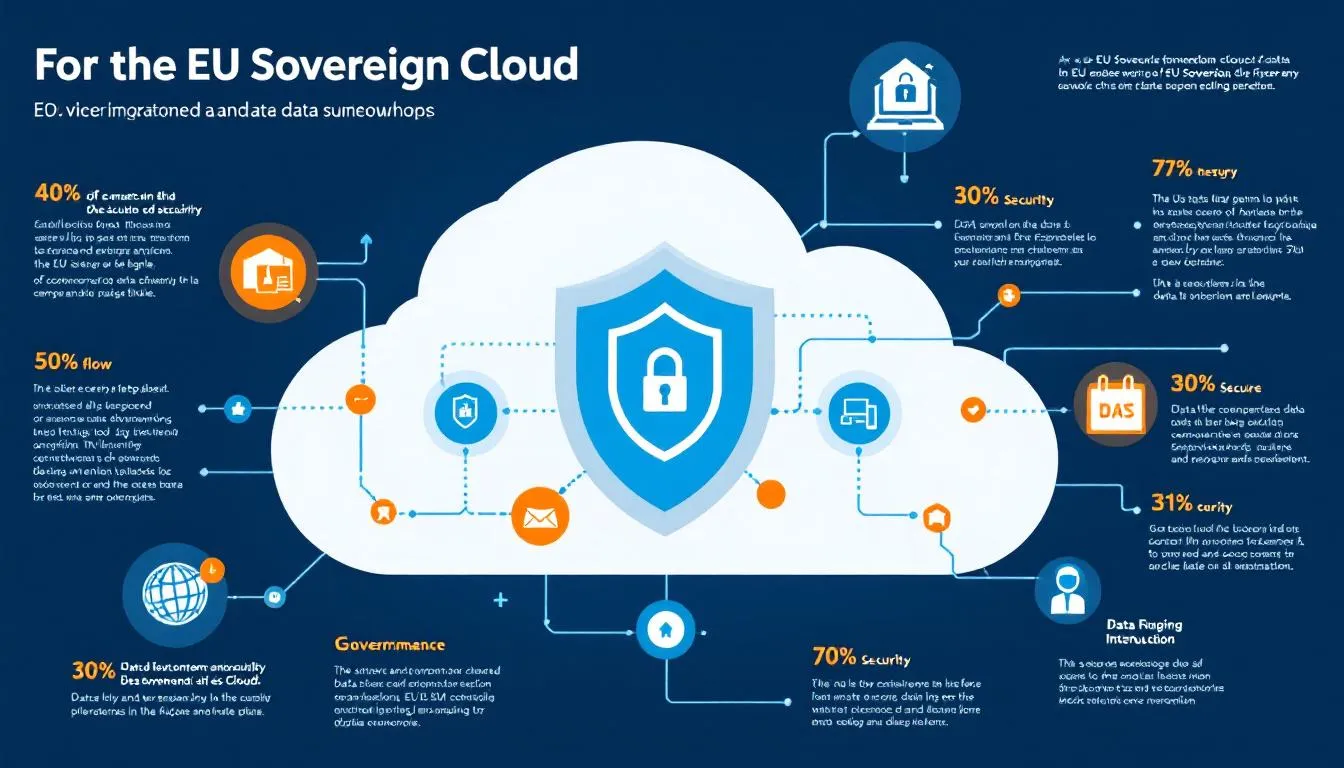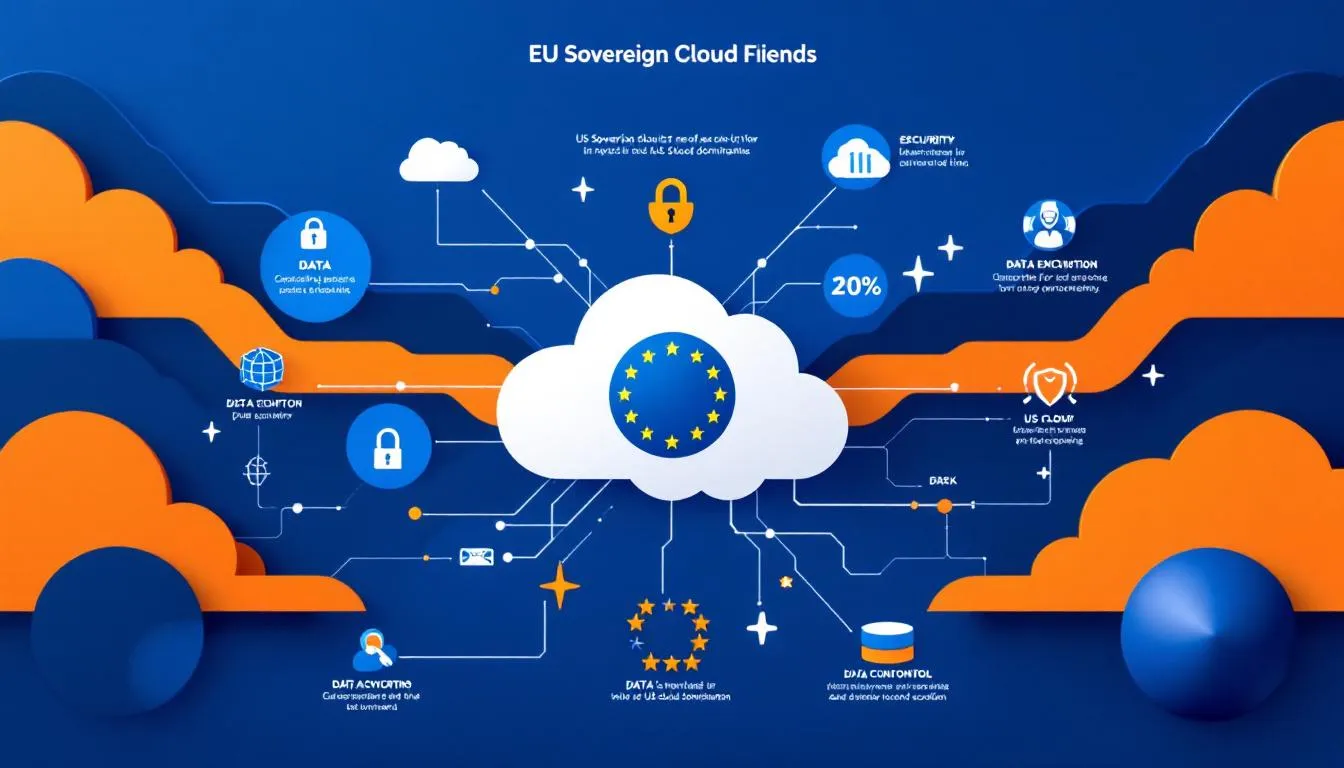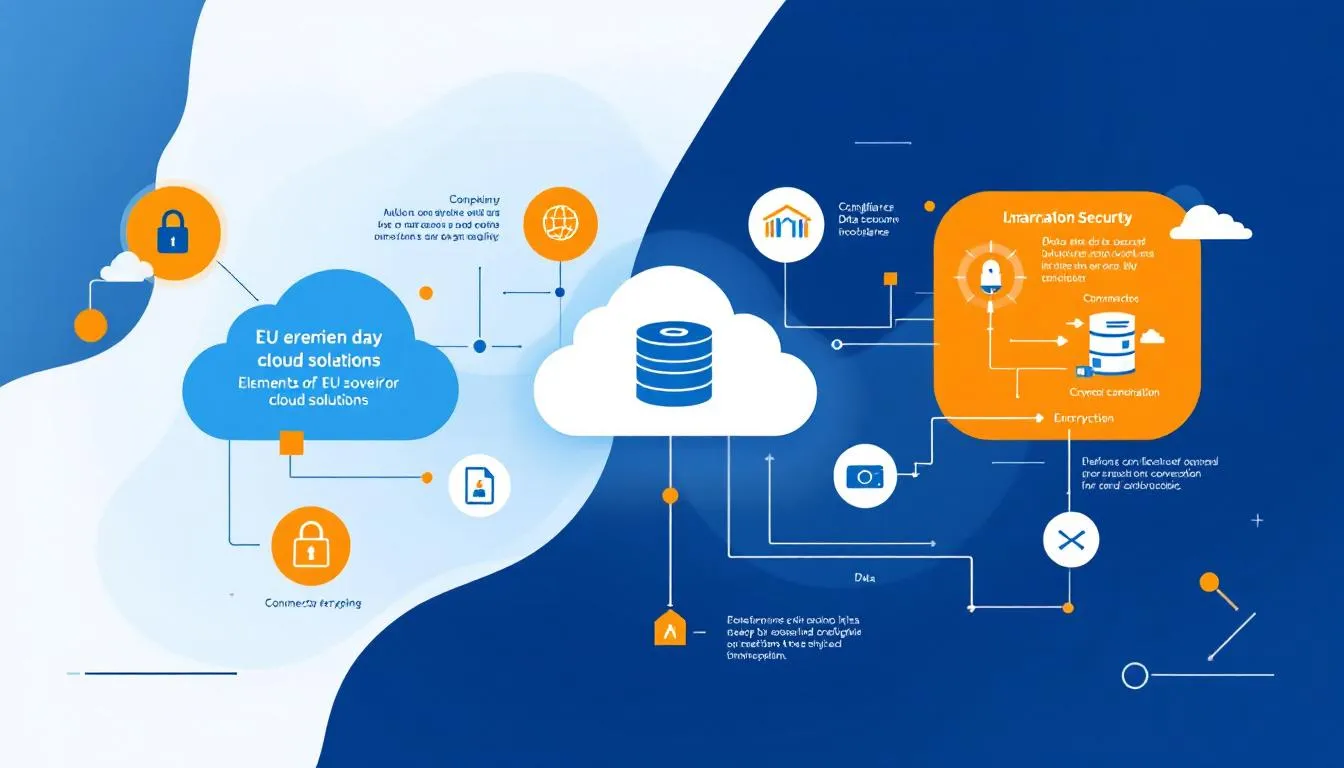What Is EU Sovereign Cloud and Why It Matters for Data Security
The EU Sovereign Cloud is a cloud infrastructure that meets strict EU data privacy standards. It keeps data under European control, helping organizations comply with local laws. This article explores what is EU Sovereign Cloud and its importance for data security and compliance.
Key Takeaways
- The EU Sovereign Cloud aims to ensure digital sovereignty, enabling organizations to comply with strict EU data residency and privacy regulations while maintaining control over their data.
- Adoption of EU Sovereign Cloud solutions is driven by the need for enhanced data security and legal protections under EU laws, providing organizations with safeguards against foreign data access.
- Challenges in adopting EU Sovereign Cloud include complex regulatory compliance requirements and integration with existing systems, which can increase operational costs and complexity.
Understanding EU Sovereign Cloud

The EU Sovereign Cloud is designed to fulfill digital sovereignty needs. It also provides all the advantages of cloud computing. Its primary purpose is to create an infrastructure that adheres to the stringent EU data residency and privacy regulations, ensuring that data and operations remain under European control. The EU Sovereign Cloud is configured as a secure, dedicated cloud environment designed to meet regulatory and security requirements.
This concept is vital for European organizations looking to maintain compliance with local laws and retain control over their data. Sovereign cloud providers enable industries to keep their data within defined geographic and legal boundaries, offering solutions that align with specific country sovereignty requirements.
Key Characteristics of EU Sovereign Cloud
Sovereign cloud services must meet the following requirements to ensure compliance and oversight:
- Operated by legal entities based in the EU.
- Partner with cloud providers headquartered in the EU to guarantee adherence to local regulations.
- Support operations exclusively by personnel residing in the EU to ensure data remains under European control.
- Cloud providers must have the capability to support data residency requirements within the EU, essential for compliance with digital sovereignty laws.
Moreover, cloud providers must implement specific organizational controls to uphold data privacy and sovereignty. These controls include robust encryption, stringent access restrictions, and continuous monitoring to ensure that data is secure and remains within the EU.
These key features enable European organizations to comply with EU regulations and safeguard their data from unauthorized access within the European Union, as outlined by the European Commission.
Data Sovereignty vs. Data Residency
Data sovereignty refers to the legal framework governing the storage and access of digital information. In the context of cloud sovereignty, it means that data must be located in the EU and governed by regional law. Digital sovereignty in the EU entails keeping data within a geographic boundary for compliance or competitive reasons. This is crucial because the location of data storage directly impacts compliance with data sovereignty laws and the ability to retain control over the data.
Digital sovereignty is based on four key tenets:
- Data residency
- Data privacy
- Security and resilience
- Legal controls
The General Data Protection Regulation (GDPR) is a cornerstone of data sovereignty law in the EU, providing robust protections for personal data. GDPR specifically safeguards personally identifiable information (PII), ensuring compliance with data privacy laws and sovereignty requirements.
Keeping data within the EU shields it from foreign laws that could compel access, unlike data stored in other jurisdictions. This legal framework ensures that organizations can avoid compliance issues from external jurisdictions and maintain control over their sensitive data.
The Need for EU Sovereign Cloud

The push for EU Sovereign Cloud is driven by the need to safeguard personal data and ensure control over digital sovereignty. Many organizations face challenges in adopting sovereign cloud solutions due to regulatory and operational complexities. European cloud providers play a crucial role in achieving strategic digital sovereignty in cloud services.
The landscape of sovereign cloud in Europe and other regions is expected to evolve significantly due to increasing data protection regulations. Sectors such as healthcare and finance, which require strict compliance with regulatory frameworks, are projected to see substantial growth in the adoption of sovereign cloud services.
The EU aims for a significant increase in data center capacity and sustainable practices by 2030, underscoring the importance of sovereign cloud solutions in the region.
Impact of US Cloud Dominance
The cloud industry is dominated by US tech giants like Amazon, Google, and Microsoft, which impacts global data practices. These companies face concerns about their data privacy systems and ongoing compliance with regulations. US laws require tech giants to hand over data to US government agencies, compromising EU data privacy efforts. This creates a challenge as US firms control data in Europe but must comply with US directives.
US firms are forming European entities and partnerships to gain legal control over data within the EU, addressing these issues. Sovereign cloud offerings are designed to deliver similar performance, management, and availability as public cloud services, but with strict adherence to EU regulations and compliance requirements. Amazon’s European Sovereign Cloud initiative ensures that data processed remains within the EU, addressing compliance needs.
Data residency mandates that stringent data residency requires storing data within specific geographic boundaries, where data is stored is critical for EU data compliance. By adhering to these mandates, European organizations can ensure that their data is protected from foreign legal frameworks and maintain control over their information.
Regulatory Drivers
An interlocked web of regulators and regulations, including the GDPR, guides cloud sovereignty in the EU. Key aspects include:
- Political pressure and citizens’ demands for protection against foreign interests drive the regulatory evolution of cloud sovereignty laws in the EU.
- The evolving regulatory framework demands cloud solutions that align with strict data sovereignty and privacy regulations.
- Sovereign cloud solutions necessitate special regulatory controls tailored to meet specific legal requirements and regulatory requirements.
- Providers must focus on meeting EU compliance standards to ensure data integrity and protection.
- A comprehensive understanding of regulations like GDPR is essential for sovereign cloud providers to meet compliance needs effectively.
Recent EU regulations, such as the Digital Markets Act, impose new obligations on cloud providers regarding user data privacy, consent management, and market fairness. These regulations are designed to enable transparency for users and ensure fair practices in the digital market.
The EU is developing a European cybersecurity certification scheme for cloud services to ensure higher data protection levels. The AWS European Sovereign Cloud aims to meet strict compliance and sovereignty requirements of public sector clients.
Sovereign clouds help organizations achieve compliance with various geographical and political regulations, ensuring that their data remains secure and under their control.
Leading Providers of EU Sovereign Cloud

The EU sovereign cloud market is supported by major tech companies constructing data centers in Europe to meet the growing demand. Leading providers like Amazon, Microsoft, and Google are developing European data centers to support sovereign cloud initiatives and strengthen data privacy and independence. European governments are also actively promoting the development of a European data infrastructure to enhance sovereignty and data privacy. AWS is notably investing €7.8 billion in infrastructure for its European Sovereign Cloud, making significant strides in the market.
AWS European Sovereign Cloud
Amazon is at the forefront of developing the European sovereign cloud. Their initiative uses ‘sovereign’ branding, setting it apart from its competitors and emphasizing their commitment to compliance and data sovereignty within the EU. The AWS European Sovereign Cloud ensures that data processed remains within the EU, addressing the needs of public sector organizations and other entities with stringent compliance requirements.
By investing heavily in European infrastructure, AWS aims to provide robust cloud services that meet the sovereignty requirements of European customers. This initiative not only enhances data security but also ensures compliance with EU regulations, providing a reliable solution for organizations looking to maintain control over their data.
Other Major Providers
Microsoft is also developing its own sovereign cloud offerings tailored to European compliance and data protection needs. Their European cloud solutions aim to compete with AWS and enhance data sovereignty. Google is focusing on providing cloud solutions that adhere to EU data protection regulations, working on launching its own sovereign cloud solutions tailored for European regulatory conditions.
European companies are increasingly offering sovereign cloud solutions to meet national security and data protection regulations. These efforts by major European providers ensure that European organizations have access to cloud services that comply with local laws and provide robust security measures.
Challenges in Adopting EU Sovereign Cloud

Adopting EU sovereign cloud solutions presents several challenges for organizations:
- Regulatory compliance is a significant hurdle due to the complex and constantly evolving digital sovereignty laws and regulations.
- Implementing a sovereign cloud requires new IT infrastructure and governance to meet specific requirements.
- These requirements can be financially and operationally demanding.
Unlike managing data in-house, sovereign cloud solutions offer enhanced control over data location, security, and compliance, helping organizations address sovereignty concerns more effectively. Sovereign cloud providers also help customers meet regulatory, legal, and sovereignty requirements through tailored cloud solutions, ensuring sensitive data is processed securely within the EU.
Compliance Costs
Compliance with EU laws demands substantial ongoing investments in infrastructure and legal expertise, increasing operational complexity. The influence of US cloud providers raises concerns about compliance with EU data protection laws due to their legal obligations to share data with US authorities. Sovereign cloud deployments must ensure flexibility to enable compliance with overlapping foreign jurisdictions’ regulations and security standards.
Data sovereignty involves legal compliance regarding the management and access to data based on its location. Customers may have unique needs for specific regulatory controls and accreditations when it comes to sovereign cloud solutions and data sovereignty requirements, which can add to the compliance costs.
Integration with Existing Systems
Deploying sovereign clouds must allow for regulatory compliance across multiple jurisdictions, which can be financially taxing. Organizations with long-standing commitments to other cloud providers may face significant challenges when integrating sovereign cloud solutions with their existing IT infrastructure.
Ensuring seamless integration requires careful planning and execution to avoid disruptions to business operations. This often involves updating legacy systems, training staff, and investing in new technologies, all of which contribute to the complexity and cost of adopting sovereign cloud solutions.
Benefits of EU Sovereign Cloud

Establishing a sovereign cloud ensures compliance with EU regulations, which is vital for businesses operating within the legal framework of the Union. Sovereign clouds provide enhanced data security by offering robust security measures tailored to safeguard sensitive data and ensure resilience. Leading providers offer data sovereignty as an inherent part of their cloud services, ensuring compliance and security for organizations operating in regulated regions.
Amazon’s plans to enhance its European operations under the sovereign cloud model contribute to the overall landscape of EU cloud services, providing organizations with reliable and compliant independent cloud solutions.
Enhanced Data Security
Sovereign clouds implement robust encryption strategies to protect sensitive data against unauthorized access. A zero trust architecture provides visibility and control to secure data at its source, ensuring that customer data remains protected. These measures provide a framework for robust protection against data breaches and unauthorized access, enhancing overall data security.
Sophisticated encryption and access control mechanisms in sovereign clouds help organizations safeguard sensitive data from cyber threats and comply with stringent EU data protection regulations. This level of security is crucial for maintaining trust and ensuring the integrity of customer data.
Legal Protections
EU regulations like GDPR offer robust protections for personal data stored within the EU, ensuring privacy and compliance. Data stored in EU sovereign clouds is shielded from non-EU laws, minimizing the risk of external data access and ensuring that organizations remain compliant with local regulations.
These legal protections are essential for organizations operating in highly regulated industries, as they provide additional layers of security and peace of mind. Leveraging EU sovereign clouds allows organizations to protect their data from foreign legal frameworks and maintain control over their information in accordance with eu law.
Future of EU Sovereign Cloud
The future of the EU sovereign cloud is promising, with plans to propose the Cloud Act and AI Development Act in 2025 aimed at significantly expanding data center capacity to meet future demands.
An increase in the number and complexity of digital sovereignty laws and regulations is predicted, driving further innovation and investment in sovereign cloud infrastructure.
Innovations in Data Security
Future advancements in encryption methods aim to significantly enhance data protection measures, providing additional protection. These innovations will likely improve data protection capabilities in cloud infrastructures, providing sophisticated encryption and access control mechanisms to protect customer data. A robust data protection strategy will be essential in this evolving landscape.
As cyber threats continue to evolve, the importance of robust data security measures cannot be overstated. Future encryption methods and security innovations, including hardware security module solutions, will play a critical role in ensuring that sovereign clouds remain secure and compliant with stringent data protection regulations.
Expanding Market Opportunities
The EU’s cloud market is expected to expand significantly, creating new growth opportunities in highly regulated industries. The potential growth in the EU’s cloud market could unlock €1.2 trillion by enhancing digital infrastructure and capabilities.
AI capabilities will play a vital role in leveraging these digital markets opportunities, driving innovation and efficiency in regulated industries. Enhancing digital infrastructure is crucial for supporting the scalability and security needs of these industries, ensuring that they can meet the demands of a rapidly evolving digital landscape.
Choosing the Right EU Sovereign Cloud Provider
Selecting the right EU sovereign cloud provider involves evaluating several critical factors:
- Compliance support
- Technological capabilities
- Data sovereignty as a core feature, ensuring the solution meets digital sovereignty requirements
- Delivery of a robust solution that aligns with EU standards and regulations
- Providing organizations with the necessary tools to maintain compliance and protect their data
Single-vendor solutions owned by an approved legal entity are often preferable, as they simplify the compliance process and ensure legal oversight.
Evaluating Compliance Support
A full-service sovereign cloud provider must have the expertise and processes necessary to ensure compliance with EU regulations. This includes maintaining up-to-date knowledge of evolving regulations and providing comprehensive support to help organizations adhere to these standards. Compliance support is critical when selecting a sovereign cloud provider, as it ensures adherence to EU regulations and protects data integrity.
Effective regulatory support by cloud providers can significantly enhance overall data security for organizations. Selecting a provider with robust compliance capabilities helps organizations mitigate risks related to regulatory breaches and ensures data security and compliance with EU laws.
Assessing Technological Capabilities
Evaluating a provider’s technological capabilities is essential for selecting the right EU sovereign cloud provider. Providers must demonstrate how their technology aligns with EU standards and requirements, ensuring that their solutions meet compliance mandates critical for data sovereignty.
Aligning technology with EU regulations ensures security and legal protection for customer data. Organizations should assess the technical features of a provider to ensure they offer robust security measures, sophisticated encryption, and comprehensive access control mechanisms.
This assessment will help organizations choose a provider that can effectively protect their sensitive data and comply with stringent EU data protection regulations.
Summary
The EU Sovereign Cloud represents a significant advancement in addressing the data security and compliance needs of European organizations. By ensuring that data remains within European borders and under European control, sovereign clouds provide robust security measures, legal protections, and compliance with stringent EU regulations. As the landscape of digital sovereignty evolves, organizations must carefully evaluate their cloud providers to ensure they meet the necessary compliance and technological standards. Embracing the EU Sovereign Cloud not only enhances data security but also positions organizations for future growth and innovation.
Frequently Asked Questions
What is the difference between a government cloud and a sovereign cloud?
The key difference between a government cloud and a sovereign cloud lies in data jurisdiction; a government cloud may not guarantee data residency within a specific country, whereas a sovereign cloud ensures that all data and operations are confined to a particular country or region under local laws. Thus, a sovereign cloud provides stronger data sovereignty and compliance.
What is an EU Sovereign Cloud?
An EU Sovereign Cloud is designed to uphold digital sovereignty, ensuring that data and operations are securely controlled within Europe while leveraging the advantages of cloud computing. This approach addresses concerns regarding data privacy and security for European entities.
Why is data sovereignty important?
Data sovereignty is important as it ensures that data is governed by local laws, safeguarding sensitive information from foreign jurisdictions and compliance challenges. This control is essential for organizations to maintain the integrity and security of their data.
What are the challenges in adopting an EU Sovereign Cloud?
Adopting an EU Sovereign Cloud presents challenges such as ensuring regulatory compliance, incurring high costs for new IT infrastructure, and integrating these cloud solutions with existing systems. Addressing these issues is crucial for successful implementation.
Who are the leading providers of EU Sovereign Cloud services?
The leading providers of EU Sovereign Cloud services include AWS, Microsoft, and Google, all of which focus on solutions that comply with European data protection regulations.